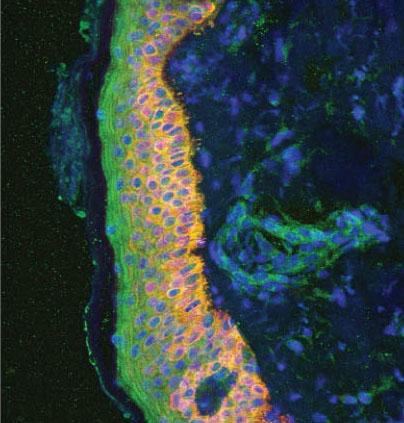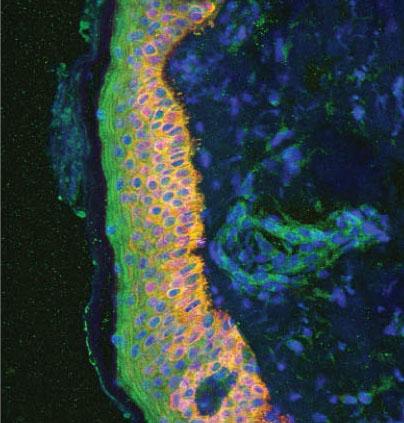
Credit: Helmholtz Zentrum München
The antibody ustekinumab is being used successfully for the treatment of psoriasis since 2009. It inhibits the underlying inflammation by neutralizing certain messengers of the immune system. Researchers at the University of Zurich and the Center of Allergy and Environment in Munich have now shown that one of these messengers could actually be helpful in battling the disease.
Common psoriasis, also called psoriasis vulgaris, is an inflammatory skin disease that is characterized by severely scaling skin in areas ranging from small to palm-sized. The disease is estimated to affect between two and three percent of all Europeans. The cause is said to be immune system malfunctions: the underlying mechanism involves the immune cells reacting to skin cells.
Neutralizing the inflammation messengers as effective therapy
The treatment therefore aims to 'pick off' the inflammation messengers. For example, the antibody ustekinumab binds the two interleukins IL-12 and IL-23 and consequently inhibit their supposed proinflammatory effects. The substance is especially used to fight plaque psoriasis in patients who fail to respond to superficial therapies.
"The research findings that have been achieved in the last ten years show that IL-23 plays the central role in the development of psoriasis," explains Burkhard Becher, professor at the Institute of Experimental Immunology of the University of Zurich and leader of the work that has been published in Nature Communications. "According to our results, IL-12 however has a positive effect on the skin affected by psoriasis."
Effect on Interleukin 12 might be counterproductive
In their study, the researchers first used experimental models to examine the influence of the individual messengers IL-12 and IL-23 on skin cells. These tests showed that IL-12 activates a protective program in the skin cells themselves and prevents the infiltration of certain pathogenic immune cells (IL-17-producing T cells), which inhibits the inflammatory reaction.
Burkhard Becher assesses the results: "Our experiments indicate that IL-12, unlike IL-23, has a quite positive effect in the skin affected by psoriasis. Because the active substance ustekinumab, which is routinely used in treating psoriasis, neutralizes both IL-23 and IL-12, however, there should be a thorough examination of whether or not the collateral blockade of IL-12 is counterproductive."
The scientists plan further research in the future to see if IL-12 could also have a positive effect on other symptoms. They criticize that its role and mode of action have not been sufficiently investigated so far. Stefan Haak, research group leader at the Center of Allergy and Environment (ZAUM), a joint undertaking of the Helmholtz Zentrum München and the Technical University of Munich (TUM), states: "New data from clinical studies support our hypothesis and the specific inhibition of the IL-23/Il-17 axis alone would probably be a better-targeted alternative."
###
Media Contact
Burkhard Becher
[email protected]
0041-446-353-703
@uzh_news
http://www.uzh.ch
############
Story Source: Materials provided by Scienmag




